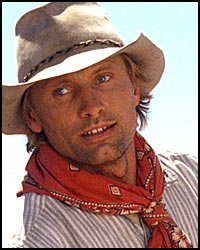 Viggo Mortensen ('Hidalgo')
Viggo Mortensen ('Hidalgo')
'Ringing The Changes'
Born in New York to a Danish father and an American mother, Viggo Mortensen spent the early part of his childhood in Manhattan. His family traveled a great deal and he spent several years living in Venezuela, Argentina and Denmark. He began acting in New York, studying with Warren Robertson. He appeared in several plays and movies, and eventually moved to Los Angeles, where his performance in "Bent" at the Coast Playhouse earned him a Drama-logue Critic's Award. Mortensen is also an accomplished poet, photographer and painter.
What drew you to John Fusco's script? "What I like about the way Joe Johnston told this is that he's able to tell an entertaining, thought-provoking story and [still] respect the audience. I just liked that it was, potentially, a rousing adventure story, a classic heroic journey, not unlike 'Lord of the Rings', but from a different point of view."
Did you feel that you had to change anything in the way the movie came across? "Well, I thought if this is done in a respectful way it would be for the best, but I guess it could have been done in many different ways. It could have lent more toward making it sort of a jingoistic exercise. Sort of "a crusading cowboy goes and kicks ass in the Middle East." It could also have been a really heavy-handed message story. What I like about the way Joe Johnston told this is that he's able to tell an entertaining, thought-provoking story and [still] respect the audience."
 What are your memories of shooting this film? "I signed up for this, and we shot it all before the recent invasion of Iraq. Our last few days of shooting were just as that was happening. You know, there are people who have said that "Oh, well, they're capitalizing on that. Sending a cowboy over to the Middle East, riding against a bunch of Arabs and Muslims, and, oh yeah, I know what this is." Some people have said that."
What are your memories of shooting this film? "I signed up for this, and we shot it all before the recent invasion of Iraq. Our last few days of shooting were just as that was happening. You know, there are people who have said that "Oh, well, they're capitalizing on that. Sending a cowboy over to the Middle East, riding against a bunch of Arabs and Muslims, and, oh yeah, I know what this is." Some people have said that."
As an actor, what are some of the challenges you face in portraying a real person on-screen? "I try to be respectful to what I can learn about him. In the case of Frank Hopkins, it's not just what's written, which is limited in that it's mostly specialized equine history. People [have written] about his forward thinking in terms of appreciating the mustang as a breed. His approach to racing — he was known as much for taking good care of his horses as he was for winning. I found it equally instructive to [pay attention to] the oral tradition. There's an oral tradition, stories about Hopkins, Hidalgo, and other horses that have been handed down [among the Dakota people]. It's really interesting to hear that."
Can you recall any of those stories now? "There was a woman, who was 94 at the time, and she still talked about having met him as a little girl. I also have in mind that this is myth. And there are a lot of the things that [are] expanded on or changed [that] are metaphor, [that] are helpful in highlighting certain values or ideas. Our identity as a nation is largely based on myth. It's storytelling. Making up stories. Exaggerating the accomplishments of extraordinary individuals. You see it all the time, whether it's John Kennedy or George Washington. I'm also aware of the fact that myth can be misapplied. You see that touched on in an interesting way [in the movie] with Buffalo Bill. I think his portrayal is really balanced, because he was a really good horseman and someone who really knew the Wild West. But at the same time you see the businessman. Myth is sometimes used in the wrong way."
Please explain this more "Well, you saw the Germans do it in the '30s using Nordic mythologies to justify unjustifiable programs and actions, and you saw the Italians do it. Mussolini did it as far as the ideals of ancient Rome. You see Bush and Reagan do it with the myth of the cowboy. And that turns people off. They think of cowboys as being individualists, whose individualism is predicated on preventing others from being individuals. Which is not the cowboys I've met and the ones I've worked with on this movie — they're not that way."
Back To Archives

